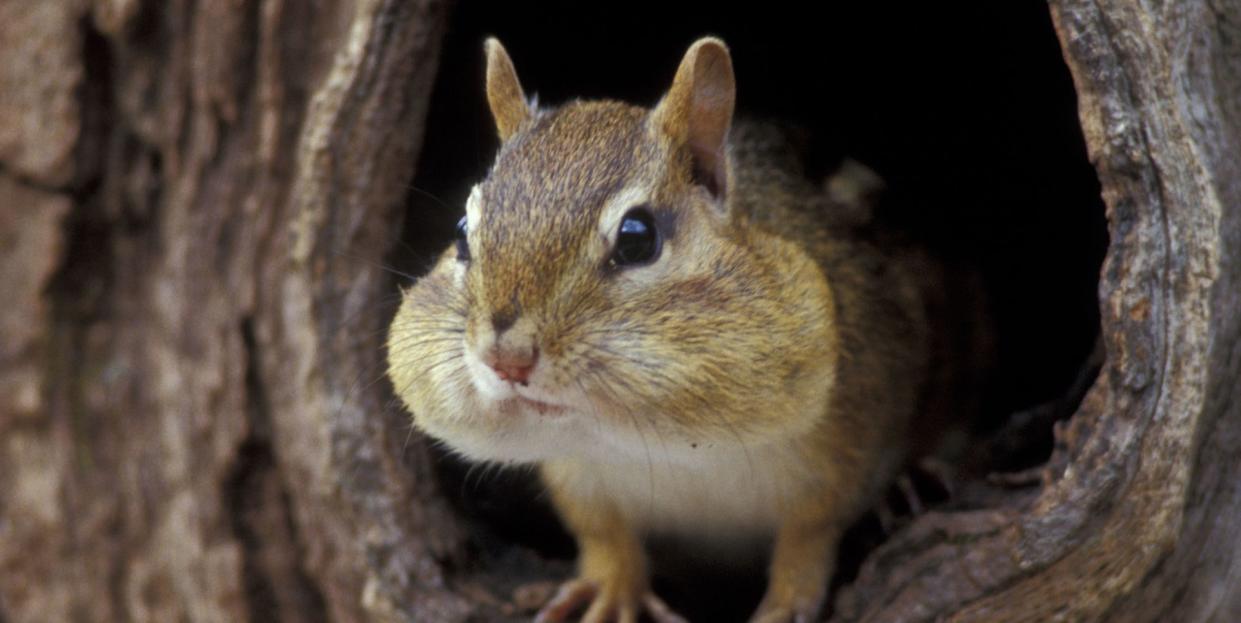Chipmunks Have Been Wreaking Havoc on Your Yard This Summer? You're Not Alone

Chipmunks—with their puffy, food-filled cheeks—are arguably the cutest of all the rodents. But homeowners who've encountered the furry little critters know that they can be a total pain, burrowing into gardens and ripping holes in outdoor rugs. Well, if you live in the Northeast U.S., brace yourself: You are, in fact, seeing a lot more chipmunks right now.
Why You're Seeing So Many Chipmunks
"It was just a perfect storm for chipmunks," says William (Bill) Kilpatrick, professor emeritus at the University of Vermont's biology department. Kilpatrick tells House Beautiful that the nut production, particularly from beech trees in the Northeast, was very high. So the chipmunks were able to feed on them all winter when they periodically awake from their hibernation. The abundance of nuts allowed a large number of their first litter in the early spring to survive. There were also plenty of nuts for the adults to survive, so they were able to produce a second healthy litter in June, causing another wave of young chipmunks.
Based in New York, the Cary Institute of Ecosystem Studies has been monitoring populations of chipmunks in Hudson Valley for about 30 years. Richard S. Ostfeld, a core scientist at the institute, tells House Beautiful in an email that the ongoing pandemic has forced them to delay the start of their field season, and they're just starting to collect data. But, so far, the observations suggest that there's a high population of chipmunks in New York right now. Ostfeld attributes the abundance of chipmunks this year to the high amount of acorns in fall 2019.
What Environments Chipmunks Are Drawn to
Eastern chipmunks, Ostfeld says, mainly occupy deciduous and mixed forests, "but they thrive in suburban and even urban landscapes too, as long as there is some forest around." Are you growing fruit in your garden? Well, that could be another reason why chipmunks are drawn to your home, since their diet also includes fruit. Chipmunks eat seeds, too. So if you have a bird feeder, that could be another attractant.
If rocks are a big part of your outdoor landscape, that could be another reason chipmunks are drawn to your home. "They’re favorite habitat is rocky, protected areas that they can get in and burrow underneath," Kilpatrick says. These kinds of areas makes it much harder for predators to dig them out.
How to Keep Chipmunks Away
"It’s not easy," Ostfeld says. Be wary of chipmunk removal products like ultrasonics, which don't go far even if they work, and poisons, which can go up the food chain and potentially harm other animals. "Most products marketed to repel chipmunks haven’t been scientifically tested and probably don’t work," Ostfeld warns. Even hunting and trapping them, which isn't legal in every state, might not be effective since neighboring chipmunks might replace the hunted ones.
Instead, try encouraging natural predators like foxes, owls, hawks, and weasels to hunt them. And if you're really committed to keeping chipmunks away, you can buy predator urine from hunting companies, and spray it around your yard. Or, you can simply wait it out. Ostfeld says that most chipmunks die in the first year of their lives (though some survive for two to three years). So come winter, many of the chipmunks you're seeing will likely die. Ostfeld's solution is to just live with them, planting a couple extra tomatoes in his garden, so he'll have enough if chipmunks take some. Kilpatrick's favorite way to keep chipmunks away from his home? His neighbor's cat. "[He's] a Main Coon cat, so we encourage him to visit all the time," Kilpatrick says. "He loves hunting chipmunks."
Follow House Beautiful on Instagram.
You Might Also Like


